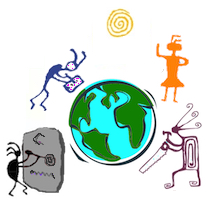
I am seeing questions on Quora and Reddit about what to do in a gap year from university during the pandemic, from people who seem to think that there’s a safe place to go, and a safe way to get there, without contracting nor spreading the novel coronavirus. It’s so frustrating – the reality is that no one should travel now unless it’s essential travel, and certainly not for a year: situations within countries, at borders and on airlines change dramatically from month to month, which can strand you somewhere abroad, with hotels or homestays closed, plus, you could contribute to the spreading of the virus, even if you never contract it yourself.
So, what ARE the options for a student who decides not to start a new semester or entire study year at a university in the Fall or Spring?
You could, in a gap year, or gap semester, stay in your community and:
- Volunteer with local Meals on Wheels and food banks, who are still involving onsite volunteers, or undertake any of these suggested onsite volunteering activities in the time of the novel coronavirus.
- Volunteer online with the myriad of virtual volunteering activities out there.
The more you volunteer, the more you will be transformed by the experience, the more you will learn, and the more you should see leadership opportunities you might want to initiate or undertake. You may end up leading your own virtual project at a program you have worked with and established trust with.
You can also:
- Trace your family tree, scan family photos, upload those photos online and record family members on video calls talking about family memories. There will never be a better time to work with family members online to get your family names and dates and places and stories recorded.
- Study another language. Duolingo and Babbel are two great resources.
- Take classes that are NOT offered at the university you will attend. Some good resources for free courses are Open University’s Open Learn and MIT’s Open Courseware.
The key to any of the above working is that you need a SCHEDULE and a COMMITMENT. Create a workspace where you will do these things. Carve out a regular time of day and days of the week you will do these activities. Create deadlines. Track your progress. Celebrate your accomplishments and results. Learn from your mistakes and challenges. Document your experiences with a journal or a blog or YouTube videos. And if you do this, then at the end of a year, you will have something much more substantial to show for it than Instagram photos that say, “Hey, look at me!” You will have something much more substantial than vanity volunteering. In fact, you will have proven you can work remotely, something employers very much like to see.
Also see:
- Rethinking ethics of volunteering abroad medical missions
- Medical Voluntourism Can Cause Serious Harm
- The harm of orphanage voluntourism (& wildlife voluntourism as well)
- Volunteers themselves speaking out about voluntourism
- Isn’t my good heart & desire enough to help abroad?
- “But I wanted to help POOR people…”
- Vanity Volunteering: all about the volunteer
- In defense of skills over passion
- Want to work internationally? Get involved locally.
- Is it really *impossible* to break into humanitarian work?
- How to Get a Job with the United Nations or Other International Humanitarian or Development Organization

If you have benefited from this blog or other parts of my web site and would like to support the time that went into researching information, developing material, preparing articles, updating pages, etc. (I receive no funding for this work), here is how you can help.
